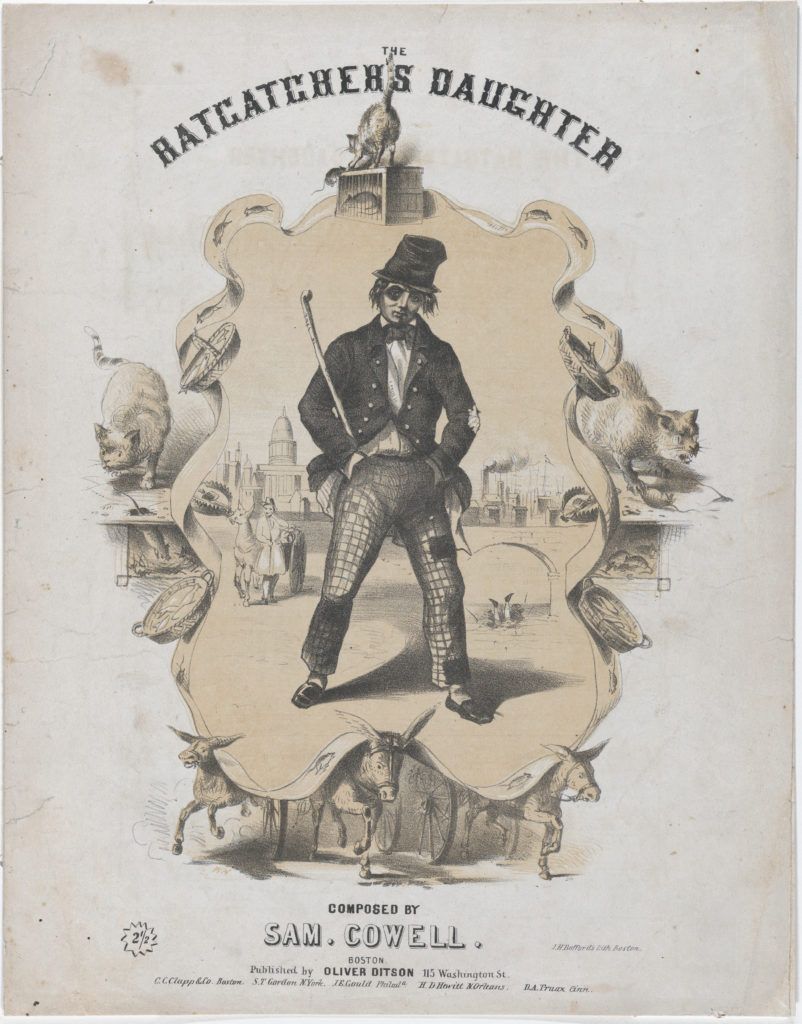
The Ratcatcher’s Daughter, sheet music cover
Uncollected Folk
In his valedictory Uncollected Folk column, ROY KERRIDGE imagines how future folk songs (if there are any) might sound
To those highminded Victorians who took part in the literary discovery of folklore, it was a revelation to find out that humble and illiterate people had developed worthwhile art forms of their own. Thanks to folklore’s pioneers, we have classic books of collected folk tales, from the Brothers Grimm to Uncle Remus, not to mention The Arabian Nights. Then came the folk song collectors, whose works can be studied in the wonderful library at Cecil Sharp House near Regent’s Park. But what happens to folklore when “the folk” learn to read and write?
In America, spirituals gave way to gospel music, a sometimes excellent body of song that deteriorates the further it gets from spirituals. In England, folk songs became literary as early as the 17th century, as printed broadside ballads, the same rule applying. Among the many topical songs printed traditional favourites such as “Careless Love” and “Barbara Allen” cropped up again and again, just as they were to do years later in America as country and western or blues records. Then, in the 19th century, folk song metamorphosed into music hall song. According to the music hall song bible, Colin MacInnes’ Sweet Saturday Night (published by MacGibbon and Kee), some of the first music hall songs known were “Sam Hall”, “Villikins and his Dinah” and “The Ratcatcher’s Daughter of Islington”, all folk songs on the verge of becoming ‘half folk”. Just as with American country music, professional songwriters appeared, specialising in music hall songs. The archetypal country and western American was a manly cowboy, the archetypal music hall Englishman a comic costermonger.
In our time, “Sam Hall” has become a cowboy song, sung with great ferocity by Frankie Laine. Frankie’s narrator is no longer a murderous chimney sweep but a Western bad man. When I was a lad, “Sam Hall” had become “Nobby ‘All”, a “dirty song” sung by soldiers and older schoolboys. “Villikins and his Dinah” became the well known country and western song “Sweet Betsy from Pike”, as recorded by Ken Maynard. As for “The Ratcatcher’s Daughter”, I have heard it sung by Ernest, a venerable Sussex tramp, in the 1970s.
English “half folk”, or “commercial folk”, is now only heard at old-time pub or party sing-songs where music hall is remembered. In the East End of London, I was once shown around a deserted, semi-ruinous music hall, a place that resembled a crumbling galleried barn. (It was in use as a West Indian church.) But what if English folk songs had not come to a dead-end, but had gone on developing and keeping pace with the times?
As this is my farewell column, I shall end with a few “folk forgeries”of my own.
I had a little nutcase, nothing would he do
But lie on a mattress drinking Special Brew.
The King of Spain’s landlord punched me in the face,
All because of my little nutcase.
***
Can she heat a pizza pie, Billy Boy, Billy Boy?
Can she heat a pizza pie, charming Billy?
She can heat a pizza pie in the twinkling of an eye,
She’s a young girl and cannot stand her mother.
***
As I was a-working on the Hadron Collider,
(To me way aye, blow the world up)
I made a black hole that got wider and wider.
(Oh give me some time to blow the world up.)
Chorus:
Blow the world up, boffins, blow it away,
Oh give me some cash to blow the world up.
ROY KERRIDGE is a folklorist, journalist and the author of numerous books
EDITOR’S NOTE: I would like to thank Roy Kerridge for his contributions to the Quarterly Review, in print and on-line, since 2007. It has been a great privilege to be able to feature his unique writing talents and the vast range of his recondite knowledge and experiences. Rarely has restless intellectual curiosity been tempered by such warmth and kindliness. DT











Dear Derek,
Do you have a website for Custom Books, the publisher of Roy Kerridge’s last book, according to The Salisbury Review?